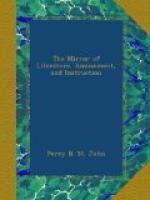On my telling the man that I had been in his room, he seemed much astonished at my boldness; for he assured me, that he carried a loaded pistol in every one of his six waistcoat pockets. I learnt also from this man, that he has or had considerable property in Jamaica; that he has lived in the premises at Lilley about twenty-three years, and during fourteen of them pursued his alchemical researches with unremitting ardour; but for the last few years shut himself up as a close prisoner, and lived in the manner I have described.
* * * * *
Here lyeth wrapt in clay,
The body of William Wray:
I have no more to say.
Weever’s Epitaphs.
* * * * *
Notes of a Reader.
* * * * *
COURT OF CHARLES II.
In the last No. of the Edinburgh Review, there is an admirably written article on Hallam’s “Constitutional History,” not a mere essay, but somewhat more like a review than usual. It contains an abundance of florid, bold, and vigorous writing, extending through upwards of 70 pages. Among the most striking passages we notice a parallel between Cromwell and Napoleon, drawn with considerable force. But our extract is from the lighter portion, as the following ludicrous sketches of some of the enormities of Charles II. “Towards the close of the Protectorate, many signs indicated that a time of license was at hand. But the restoration of Charles II rendered the change wonderfully rapid and violent. A deep and general taint infected the morals of the most influential classes, and spread itself through every province of letters. Poetry inflamed the passions; philosophy undermined the principles; divinity itself, inculcating an abject reverence for the court, gave additional effect to its licentious example. ... The favourite duchess stamps about Whitehall, cursing and swearing. The ministers employ their time at the council board in making mouths at each other, and taking off each other’s gestures for the amusement of the king. The peers at a conference begin to pommel each other, and to tear collars and periwigs. A speaker in the House of Commons gives offence to the court. He is way-laid by a gang of bullies, and his nose is cut to the bone. ... The second generation of the statesmen of this reign, were worthy of the schools in which they had been trained, of the gaming table of Grammont, and the tiring room of Nell ——.” This is but a small portion of the good set terms in which the reviewer illustrates the licentiousness of the times. Speaking of Clarendon, he says, “Mr. Hallam scarcely makes sufficient allowance for the wear and tear which honesty almost necessarily sustains in the friction of political life, and which in times so rough as those through which Clarendon passed, must be very considerable. When these




